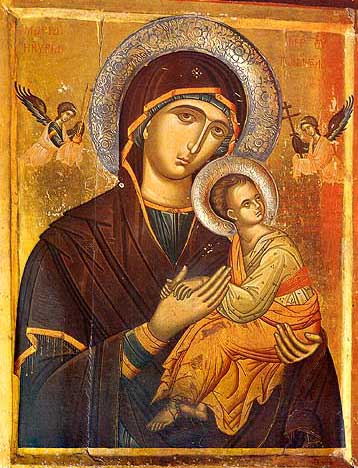The Solemnity of the Epiphany is one of the more ancient Christian Feasts. Sometimes, the celebration of the Nativity was celebrated on Jan. 6 in ancient days (especially in the East). However, the Roman practice eventually prevailed everywhere of celebrating that day on Dec. 25. The Epiphany was the date for commemorating the 1) the visit of the Magi, 2) the Jesus' baptism in the Joran, and 3) the miracle at Cana, transforming water to wine.
While in the East the day tends to focus on Jesus' baptism in the Jordan, in the West the focus has primarily been on the visit of the Magi. For this reason, the tradition of blessing homes and praying for migrants has developed.
Also, this day reveals Jesus as the way of salvation for the Gentiles. As the Magi were guided by a star from afar to adore the Savior, so Christ is the light for the path of all Gentiles. This concept of "revealing" is also connected with the liturgical Proclamation of Easter, which occurs today. Every parish should seek to have this chanted (or at least recited) on this day. The text for this proclamation may be found at the
USCCB website. Here is the
pdf file of the chant.
As mentioned, it is traditional to bless the home on the Epiphany. The
Directory of Popular Piety says the following about this tradition:
the blessing of homes, on whose lentils are inscribed the Cross of salvation, together with the indication of the year and the initials of the three wise men (C+M+B), which can also be interpreted to mean Christus mansionem benedicat, written in blessed chalk; this custom, often accompanied by processions of children accompanied by their parents, expresses the blessing of Christ through the intercession of the three wise men and is an occasion for gathering offerings for charitable and missionary purposes.
Here is a traditional example of the Blessing of the Home for Epiphany. It appears that, if a priest is not present, the father of the family may lead the family in the prayer of blessing (the holy water and chalk must be previously blessed by a priest, however).
BLESSING OF HOMES on Epiphany
As the priest comes into the home he says:
P: God's peace be in this home.
All: And in all who live here.
P. Ant.: Magi from the East came to Bethlehem to adore the Lord; and opening their treasure chests they presented Him with precious gifts: gold for the great King, incense for the true God, and myrrh in symbol of His burial. Alleluia.
Canticle of the Magnificat
Luke 1.46-55
P: "My soul * extols the Lord;
All: And my spirit leaps for joy in God my Savior.
P: How graciously He looked upon His lowly maid! * Oh, see, from this hour onward age after age will call me blessed!
All: How sublime is what He has done for me, * the Mighty One, whose name is 'Holy'!
P: From age to age He visits those * who worship Him in reverence.
All: His arm achieves the mastery: * He routs the haughty and proud of heart.
P: He puts down princes from their thrones, * and exalts the lowly;
All: He fills the hungry with blessings, * and sends away the rich with empty hands.
P: He has taken by the hand His servant Israel, * and mercifully kept His faith,
All: As He had promised our fathers * with Abraham and his posterity forever and evermore."
P: Glory be to the Father.
All: As it was in the beginning.
Meanwhile the home is sprinkled with holy water and incensed. At the end of the Magnificat the antiphon is repeated. Then the priest says Our Father (the rest inaudibly until:)
P: And lead us not into temptation.
All: But deliver us from evil.
P: Many shall come from Saba.
All: Bearing gold and incense.
P: Lord, heed my prayer.
All: And let my cry be heard by you.
P: The Lord be with you.
All: And with your spirit.
Let us pray.
God, who on this day revealed your only-begotten Son to all nations by the guidance of a star, grant that we who now know you by faith may finally behold you in your heavenly majesty; through Christ our Lord.
All: Amen.
Responsory: Be enlightened and shine forth, O Jerusalem, for your light is come; and upon you is risen the glory of the Lord Jesus Christ born of the Virgin Mary.
P: Nations shall walk in your light, and kings in the splendor of- your birth.
All: And the glory of the Lord is risen upon you.
Let us pray.
Lord God almighty, bless  this home, and under its shelter let there be health, chastity, self-conquest, humility, goodness, mildness, obedience to your commandments, and thanksgiving to God the Father, Son, and Holy Spirit. May your blessing remain always in this home and on those who live here; through Christ our Lord. All: Amen.
this home, and under its shelter let there be health, chastity, self-conquest, humility, goodness, mildness, obedience to your commandments, and thanksgiving to God the Father, Son, and Holy Spirit. May your blessing remain always in this home and on those who live here; through Christ our Lord. All: Amen.
This prayer has been taken from the following
website.
The form from the more recent
Book of Blessings is here, and can be done. I added to this the directions for chalking the door in brackets. While there is no indication for using the chalk and holy water for the newer rite, it would be in greater continuity with our tradition. If you do not have blessed chalk or holy water, however, you can still say the prayer of blessing for your home.
All make the sign of the cross as the minister says:
Blessed be the name of the Lord.
All reply:
Now and for ever.
One of those present or the minister reads a text of sacred Scripture, for example:
READING
Listen to the words of the holy gospel according to Luke:
Jesus came to Jericho and intended to pass through the town. Now a man there named Zacchaeus, who was a chief tax collector and also a wealthy man, was seeeking to see who Jesus was; but he could not see him because of the crowd, for he was short in stature. So he ran ahead and climbed a sycamore tree to see Jesus, who was about to pass that way. When he reached the place, Jesus looked up and said to him, “Zacchaeus, come down quickly, for today I must stay at your house.” And he came down quickly and received him with joy. When they all saw this, they began to grumble, saying, “He has gone to stay at the house of a sinner.” But Zacchaeus stood there and said to the Lord, “Behold, half of my possessions, Lord, I shall give to the poor, and if I have extorted anything from anyone I shall repay it four times over.” And Jesus said to him, “Today salvation has come in this house because this man too is a descendant of Abraham.
PRAYER OF BLESSING
Lord God of heaven and earth,
you revealed your only-begotten Son to every nation
by the guidance of a star.
Bless this house
and all who inhabit it.
Fill them with the light of Christ,
that their concern for others may reflect your love.
We ask this through Christ our Lord.
R/. Amen.
[After the prayer of blessing, the leader may sprinkle holy water in the rooms of the house. Then the people may take chalk, previously blessed by a priest, and inscribe on the lintels of the main door to the home a) the first two digits for the year; b) + C + M + B +; c) the last two digits of the year. E.g., for the year 2010, it would read 20 + C + M + B + 10. One might go to a priest some days beforehand and ask him to bless the chalk.]
I hope this may help you celebrate this day.
Additionally, today is an excellent day for remembering Migrants and Itinerants. Here is a prayer from the book
Catholic Household Blessings and Prayers:
Dear Jesus you came into this world as a migrant We welcome you, Jesus
There was no room for your family at the inn We welcome you, Jesus
Along with the angels in heaven We welcome you, Jesus
Along with the shepherds who wandered the hills We welcome you, Jesus
Along with the Magi who traveled from the East We welcome you, Jesus
Your family became refugees fleeing from Herod We welcome you, Jesus
In Egypt you were an alien We welcome you, Jesus
In your public life you did not have a place to rest We welcome you, Jesus
Dear Jesus, we see you today We welcome you, Jesus
In refugees fleeing war and violence We welcome you, Jesus
In immigrants seeking a better life We welcome you, Jesus
In migrant workers who enrich our land with their labor We welcome you, Jesus In seafarers and other people on the move We welcome you, Jesus
Let us pray. Dear Jesus, you are the refuge of people on the move. We ask you to grant immigrants, refugees, and other migrants peace, protection, and comfort. Help us to recognize that whenever we welcome the stranger in your name, we welcome you. Teach us to recognize your presence in every human being. Bring us together as one family, at the banquet table of your love, with you who live and reign with the Father, and the Holy Spirit, now and forever.
R/. Amen.
Also, as we commemorate the Magi giving gold, frankincense and myrrh to the Lord, today would be an excellent day for giving gifts that are particularly religious, in the event that you already gave gifts on Christmas. Finally, if you didn't move your figures of the Magi into the Nativity scene last night, DO IT NOW (unless you are celebrating the Epiphany on Wednesday, of course)! I hope you enjoy a beautiful Solemnity of the Epiphany.

 this home, and under its shelter let there be health, chastity, self-conquest, humility, goodness, mildness, obedience to your commandments, and thanksgiving to God the Father, Son, and Holy Spirit. May your blessing remain always in this home and on those who live here; through Christ our Lord.
this home, and under its shelter let there be health, chastity, self-conquest, humility, goodness, mildness, obedience to your commandments, and thanksgiving to God the Father, Son, and Holy Spirit. May your blessing remain always in this home and on those who live here; through Christ our Lord. 



